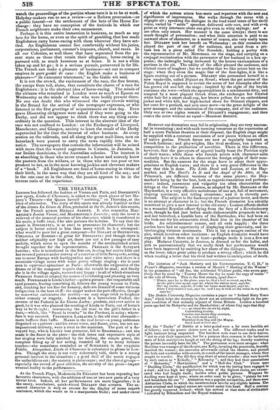THE THEATRES.
LONDON has followed the fashion of Vienna and Paris, and Dols-mew-is new opera, Linda di Chaniouni, is added to the stock pieces of her Ma- jesty's Theatre—the Queen herself "assisting," on Thursday, at the rites of admission. The story of this opera was already familiar as that of the drama La Grace de Dieu, produced at the St. ,.James's this season, for the French actress Madame ALBERT. It also resembles Max- imum's Louisa Venom*, and Mertmostmes Laurette; only the lover is relieved of the immoral portion of his character, which is transferred to his uncle, a buffo roué, who also pursues the heroine. To say that the music is, DoNizErris, is at once to pronounce its character ; but the subject is better suited to him than many which he h.:s attempted : what would be poor for a great composer—for MOZART or BEETHOVEN, CDNAROSA or Rossna—is great for DONIZETTI ; and though there is neither originality nor high art, there are not a few passages of easy melody, which serve to open the mouths of the accomplished artists brought together for the representation. FERSIANI is the Savoyard heroine ; who is introduced in the first act, leaving her native hills and her revered parents under convoy of a caravan of little Savoyards, setting out to scour Europe with hurdygurdies and white mice ; and there is a mountain-village scene with some pretty village singing : she is next seen in equivocal splendour at Paris : afterwards the exigencies of the drama or of the composer require that she should be mad; and finally she is in the village again, restored and happy : in all of which situations FERSIANI found or created the means of interesting and pleasing us very much. FORNASARI is Linda's father—quite a picture : the respectable and aged peasant, fearing something ill, follows the young woman to Paris, and, thinking her too fine for honesty, delivers himself of some virtuous indignation in the bass cleft': the singer makes the part effective, though he somewhat caricatures the senility—an easy stage-trick to heighten either comedy or tragedy. LABLACHE is a benevolent Prefect, the reverse of the Podestii in La Gazza Ladra : prudent, and ever active in _good, he it was who planned the sending of Linda to Paris, out of harm's way as he thought ; denouncing the old roué to the girl's father in a duet,—which, like " Suoni la tromba " in the Puritani, is noisy; where- fore it was encored. FREDERICK LABLACHE is the old roué aforesaid— more buffoon than buffo. MARK, is the real lover—a young nobleman disguised as a painter : and his sweet voice, and fluent, even, but not un- impassioned delivery, were a treat to the musician. The part of a Sa- voyard boy, who is Linda's best protector, fell to BRAXBILLA ; and she made it the finest in the piece : the rich tones and expressive style of her singing were fully matched by the feeling, the simple grace, the complete filling up of her acting, rounded off by so many delicate touches—she sometimes reminded us of SCHRCEDER in the exquisite Fidelim Altogether, Linda di Chamouni is calculated to please in Lon- don. Though the story is not very coherently told, there is a strong personal interest in the situations ; a good deal of the music engages the unfastidions ear ; the scenery is picturesque; and the choral groups— especially the crowd of poor children, the novelty of the piece—impart unusual reality to the performance.


























 Previous page
Previous page